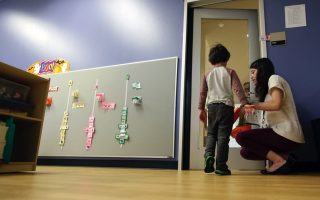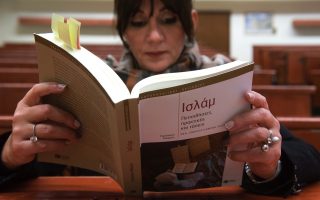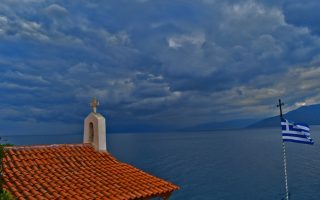A global monument against racism in Thessaloniki

It took Thessaloniki seven decades to restore its memories, recognize its mistakes, and, above all, to apologize for a piece of its history that was silently buried under the foundations of its university. Three years ago, the city’s mayor, Yiannis Boutaris, erected a monument in a corner of the campus as a reminder that this was the spot where, for 500 years, the city’s once-large community of Sephardic Jews honored their dead. Then, the mayor spoke of the undue delay in breaking the silence and beginning to talk about the dark moments of the city’s history.
It was one of the slow but steady steps toward the target set by the mayor’s office. The culmination of it all is the creation of the Holocaust Museum and Educational Center in the area of the old railway station, where the beginning of the end was written for the Jewish population of Thessaloniki.
The move came from an idea belonging to the president of the Jewish Community of Thessaloniki, David Saltiel. Boutaris adopted it and used his international contacts to promote it. The municipality and the Jewish Community of Thessaloniki (JCT) worked together methodically, and now, almost three years later with funding secured, the goal is in sight.
A six-floor circular building dominated by metal and glass and spread across 7,000 square meters will rise over the next three years, standing symbolically in the place where the death trains began transporting 55,000 Greek Jews from Thessaloniki, decimating a multicultural, multi-religious and prosperous city. The foundation stone of the Holocaust Museum will be laid at the end of 2017 in 5 acres supplied by Gaiaose SA. If all goes well, Thessaloniki will inaugurate its new museum before the end of 2019.
Funding
The project has a budget of approximately 22 million euros, 10 million of which will come from the German government (5 million in 2017 and 5 million in 2018). The rest will be covered by the Stavros Niarchos Foundation and other bodies (Jewish communities and figures). Two architects, one in Tel Aviv and one in Berlin, are working on the final plans. An international institute for the Holocaust Museum of Thessaloniki will soon be set up, based in Brussels, and a nonprofit organization in Greece will be established for the management of the construction and the initiation of the project.
From the first moment of the project, the Jewish Community of Thessaloniki established a cooperation framework to provide 20 years of experience and expertise in both the creation and the operation of the Holocaust Museum, particularly when it comes to education.
“What happened in Thessaloniki during the Holocaust is part of both local and European history, which we need to teach to young people especially to combat anti-Semitism, racism and all forms of discrimination that unfortunately are once again rising to the surface around the world,” said the director of the Shoah Memorial in Paris, Jacques Fredj, at the signing of the agreement in January 2016.
For JCT chief Saltiel, it will not be just the voice of millions of Jews who were deported, humiliated and murdered. It will be the voice of the Greek Jews and their long history in the city, which is the story of Thessaloniki itself. Beyond its educational character, the community’s intention is to document the history of worship items and beyond. They are stored at the Jewish Museum on Aghios Minas Street, which will operate in parallel as a small museum in the heart of the city.
For enrichment, says Saltiel, they will “look for items from the descendants of Thessaloniki Jews,” especially those who immigrated to Palestine in the 1930s to work in the ports of Haifa and Jaffa. Objects from Thessaloniki are in museums in Poland, and Saltiel says “the authorities are indicating their intent to return them to us.” Of utmost importance are the historical records of the JCT (100,000 documents) stored in Moscow. Their repatriation will shed light on the lives of Thessaloniki’s Sephardic Jews before the Holocaust.
Unknown chapter
“What happened in Thessaloniki is a chapter of the Holocaust which is completely unknown to the world,” says Boutaris. With the Holocaust Museum, he believes that Thessaloniki, apart from the obvious benefits of tourism and raising the city’s profile, will become a symbol to promote tolerance and fight racism. For this reason, he said, “I insisted on the parallel operation of a training center. Only in this way will we be able to have a greater awareness of what this crime means and why it should not be repeated.”
Thessaloniki, like Warsaw and Krakow, is seen as an important historical place for Jews everywhere, but much more so for Sephardic Jews, a largely unknown and neglected community. This dimension is also noted by Giorgos Antoniou, professor of contemporary history on the newly established Jewish Studies course at the Aristotle University of Thessaloniki.
“The Holocaust Museum, beyond the tragedy of the Greek Jews, beyond the tragedy of Thessaloniki’s Jews, represents the tragedy of the Sephardic Jews. The difference between this museum and those in the US and Israel is that it is located in the place where the crime was committed. It will rightfully be put on the map with the world’s leading Jewish history museums. In educational terms it will act as the umbrella for the research and teaching that has blossomed in recent years at universities and other institutions.”
Evangelos Hekimoglu, the curator of the Jewish Museum, sees it as a living organism, underlining the political and academic aspect. Twenty years ago, he says, “apart from a generation of survivors, three people were involved in [researching] the Holocaust: Polychronis Enepekides, Rena Molho and Albertos Nar. The progress made over the past seven years in research on the Holocaust (social, political, economic, ideological), is enormous. However, the fruits of these efforts will fade on their own. Only a coordinated effort for the dissemination of these efforts can be translated into the education system for future generations. This role has to be played by a new, modern Holocaust museum.”





